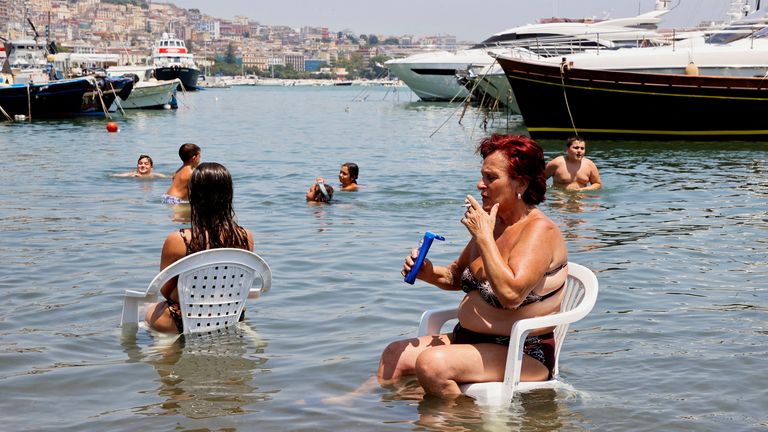Cerberus heatwave: Man ‘collapses and dies’ and people faint as southern Europe hit by record temperatures


A heatwave is set to engulf southern Europe in the coming week with possible record temperatures in some regions.
Conditions are expected to surpass 40C as the heatwave – now named Cerberus – passes through parts of Spain, Italy, France, Greece and Turkey.
The sweltering weather has already been felt across these countries with temperatures exceeding 30C.
A man reportedly collapsed and later died and people have been fainting due to the extreme conditions.
Deep shades of crimson dominated the Met Office’s European weather forecast, with the current highest temperature predictions being 42C in Seville, 40C in the Turkish city Bodrum and 38C in Athens.
North Africa will also be affected by the severe heat.
Read more:
How hot is too hot for the human body to function?
The countries sweltering in 40C heat as long-lasting heatwave grips continent
Inland Spain is forecast to boil in temperatures of up to 43C in the next few days, while places like Foggia in eastern Italy could reach 44C by the middle of next week.

In parts of Sardinia, southern Italy and mainland Greece, maximum temperatures are expected to reach 40-45C, compared with an average of around 32C.
Advertisement


Southern France will feel the heat with Nimes predicted to hit 35C and Montpellier potentially climbing to 34C.

Prague may see highs of 34C on Saturday, compared with the average of 24C.
In North Africa temperatures could hit the blistering heights of 50C – Tunisia has already endured record-breaking temperatures of up to 49C.
The heatwave is caused by high pressure originating from the Sahara.
It is expected to persist for the next couple of weeks spreading eastwards to the Canary Islands and further westwards.

Although it’s unlikely that the European record of 48.8C, recorded at Syracuse in Sicily in August 2021 will be broken, the possibility remains open.

The origin of the deadly heatwave stems from Greek mythology where Cerberus was debatably a three-headed dog guarding the gates of the Underworld.
The nightmarish hellhound is often depicted towering over flames.
Across southern Spain, Italy and France weather warnings have been issued with people being urged to take precautions when out and about as temperatures are expected to exceed 40C.
The elderly, those with health conditions and others who live in exposed areas are especially being encouraged to be mindful of the conditions.
Essential travel is advised.
Already, one man in his 40s has been reported dead after collapsing and failing to recover in hospital, while many more have passed out in the baking heat.
Meanwhile, the UK is expected to revert to average summer temperatures although unsettled weather will carry on until August.
Due to the low-pressure systems being directed to the country from the southwest, more rain is expected in Britain, contrasting southern Europe and North Africa.